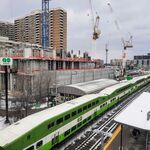Any summary of what he said?
Steve Munro wrote a pretty good summary on Twitter, which I've copied below:
TVO's The Agenda featured three interviews on the subject of Toronto's transit and the proposed subway "upload". In the first, Minister @JeffYurekMPP sounds ever so reasonable, but @spaikin let him get away with some howlers about the system.
2. Shortly into the interview, Yurek claims that any rider today will agree that "the system isn't working", but that's the existing system, and provincial plans are silent on how that will be improved.
3. Yurek claims that if you look over the past 15 years, the Crosstown is the only project that is near to completion. He ignores the Vaughan subway opened in late 2017. This error has been pointed out before, and Yurek wounds his credibility by repeating it.
4. As @iamdavidmiller would later point out, an LRT network plan was cancelled by the Fords, not by some mythic dysfunctional city council over which they had no control. Their problem was that Rob Ford hated streetcars and anything with Miller's name on it.
5. Yurek was evasive on many issues under the guise of budget confidentiality, but was happy to slag Toronto/TTC for cost overruns on projects without acknowledging that the Province has a goodly share of those too. He was not challenged on these claims.
6. Notably absent through the discussion was the fate of the existing system. Everything was about building new lines. But DoFo ran on uploading "the subway", not just new builds, and taking the cost of both construction and maintenance off of the city's hands.
7. Miller and others made the point about the importance of a network of lines. This speaks to existing rapid transit, new builds like Waterfront that are not part of Ford's plan, and to routes overall that serve more than a few corridors of interest.
8. People ride many bus and streetcar lines that will not be helped one bit by the big ticket rapid transit projects, and all riders depend on the existing system staying at least as good as is and improving their ride, their transit experience.
9. @spaikin mentioned the APTA Transit System of the Year award for the TTC back in 2017. That was for Byford's management plan,
not for quality of service as it is so often misconstrued. Byford seemed to pursue this award as part of his "audition" for his NYC job.
10. It was good to hear @JeffYurekMPP say that the province does not intend to download costs on Toronto, but this could be sophistry if the costs and revenues left in city hands worsen the city's ability to fund and operate the TTC.
11. The contribution by @iamdavidmiller in the
second segment was the most focused and it was refreshing to hear David back on the Toronto political scene.
12. Paikin made an amusing error when he referred to the boundaries of the City of Toronto as the Don and Humber Rivers. Try the Rouge and Etobicoke Creek.
13. Miller emphasized the "network" issue, but even here, there is a problem of terminology that most people thinks this means the rapid transit network, not the entire system of buses, streetcars and subways, and GO for that matter. Nothing in the provincial plan addresses this.
14. Moreover, cross-border travel 905-416 is a sore point that building new subways won't fix. Whether it's the Yonge extension or a much-improved GO corridor, Richmond Hill riders face the question of what should be an appropriate fare for their travel.
15. Possibly because this is a Toronto-centric debate about subways, nobody talked about the relatively poor quality of service on 905's transit systems. A truly regional system will require much better service "out there" and on routes that don't just exist as subway feeders.
16. The third segment
https://www.tvo.org/video/debating-transit-planning-in-toronto … features the @TorontoRBOT 's @stateofthecity and @CodeRedTO 's @pkbwood . With a debate rather than a one-on-one, we see the do sides of "do we trust DoFo" question.
17. The Board of Trade wants more uploading to the province, although it is unclear that Queen's Park wants anything beyond a few subway lines and GO, and particularly not the cost of maintaining and improving local systems.
18. CodeRedTO fears that a governance model debate will avoid the basic question of what Toronto needs and how "who's in charge" will affect the transit riders see day to day. Both sides were bogged down in the debate about the new subway proposals.
19. @spaikin erred in a reference to the Waterfront LRT line as something @SidewalkToronto would "pay for". This is not correct. Sidewalk offers to finance the line, and then only the portion of it that directly serves their development (although this may have changed).
20. Financing the line is lending money to the city, which is not the same as "paying for" it. This is an important distinction. Back in @JeffYurekMPP 's piece, there was reference to how Woodbine GO Station will be built by developers of a nearby entertainment complex.
21. The cost of a GO station on an existing line is a fraction of the cost of a subway station on a new one, and this financing/funding model does not scale up to subway construction. Moreover, there's a lot of "in between" space on any line that will not attract developer $$$.
22/22 It was an interesting program to watch if only to see the positions each party takes, but there are many unanswered questions, and a better-informed interview might have brought out more details.







